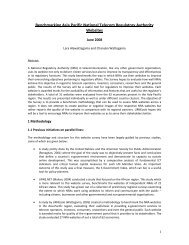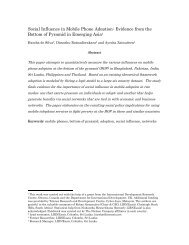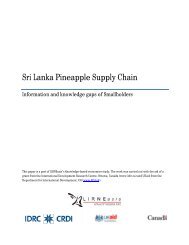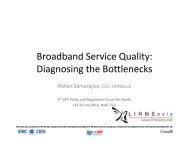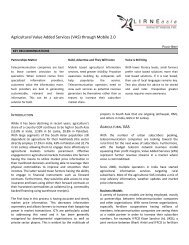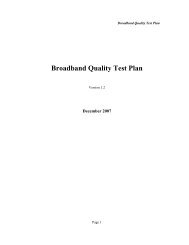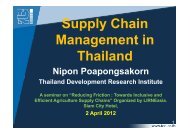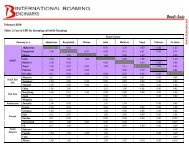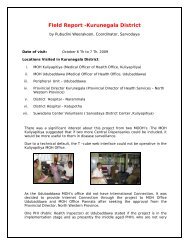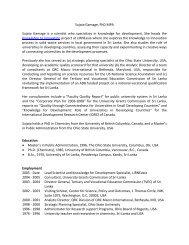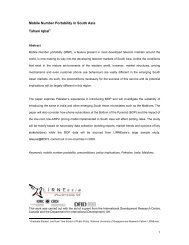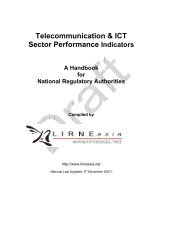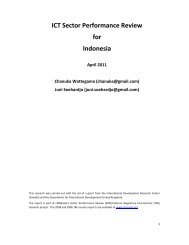Teleuse@BOP3: A Qualitative Study - LIRNEasia
Teleuse@BOP3: A Qualitative Study - LIRNEasia
Teleuse@BOP3: A Qualitative Study - LIRNEasia
You also want an ePaper? Increase the reach of your titles
YUMPU automatically turns print PDFs into web optimized ePapers that Google loves.
The younger age groups are not only the fastest adopters but they are also the ones using more innovative<br />
techniques in order to save money on phone use. The older age groups conveyed that they know how to manage<br />
their expenditures and as a result do not need to do new things to economize. If they are out of money, they will at<br />
most call from public phones or simply reload credit. The techniques used by the younger age groups, on the other<br />
hand, include owning multiple SIMs, giving missed calls, using the friends and family (F-N-F) offers, sharing load and<br />
using text messages extensively.<br />
Multiple SIMs are in vogue with the younger generations in all the countries except India. This is largely due to the<br />
ease of acquiring a SIM and the low cost in all the other countries. In Bangladesh, the average SIM costs 100 to 150<br />
taka (USD 1.40 to 2.10) from Citycell, Banglalink and Zem while Grammenphone and Warid, come within 200 taka<br />
(USD 2.80). In Sri Lanka, Celltel, Hutch and Airtel are free with Dialog and Mobitel charging between 100 to 150 SLR<br />
(USD 0.80 to 1.20) but special promos often make these free as well. In India, the costs range from 99 INR (USD<br />
1.98) to 200 INR (USD 4.00). In Thailand it is about 25 Baht (USD 0.70) and in Philippines nearly 40 Pesos (USD<br />
1.12). In all these countries, the average number of SIMs for male respondents are 3 in urban areas and 2 in rural<br />
and 2 in urban areas and 1 in rural areas for women, with the case being inverted in Thailand and Philippines. The<br />
highest number of SIMs owned by a single respondent is 5 and it is observed repeatedly in Sri Lanka, Bangladesh,<br />
Pakistan and Philippines.<br />
The prime reason for acquiring multiple SIMs is to be able to reduce costs through phone usage on the same<br />
network. Most young respondents of both the genders are aware of the networks used by most of their social circle<br />
and as a result, they try to acquire SIMs of the same networks. Most respondents in all these countries said that they<br />
have hardly ever paid for the SIMs since they have either received them through hand downs, during special events<br />
or simply for free by recharging of a higher denomination. In Sri Lanka, all the younger male respondents claimed<br />
that they had tried to get themselves a free Airtel SIM which was being distributed by the company on its launch in<br />
Sri Lanka and almost 60% of these respondents had succeeded. Many of these successful acquirers indicated that<br />
they had good relations with their Communication shop owners and as a result, the SIMs were kept in reserve for<br />
them from before. The same is true even for free SIMs given to shopkeepers alone for meeting sales targets which<br />
they then distribute or sell within their social networks.<br />
The second most important reason for the use of multiple SIMs is the lack of or problems in receiving quality network<br />
connection. This phenomenon is observed in all the countries to some extent. In the home visit in Paithan with Marun<br />
and Maini Rawat in India, they pointed out that in spite of having a Vodafone connection; they also had an Idea<br />
connection since Idea’s network is better. They suggested that in their age they did not need to switch SIMs to make<br />
calls but they were compelled to do so due to bad network connection. Similarly, all the respondents in all the<br />
protocols in Bangladesh said they have at least 2 SIMs, one of Grameenphone and the second of primarily of<br />
Banglalink or of Warid. Their reasons are that Grameen has the best network in the whole country but it costs more,<br />
while Banglalink or Warid are cheaper and they are also rapidly improving their networks. Multi SIM respondents in<br />
45




